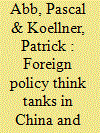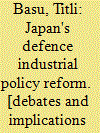|
|
|
Sort Order |
|
|
|
Items / Page
|
|
|
|
|
|
|
| Srl | Item |
| 1 |
ID:
143352


|
|
|
|
|
| Summary/Abstract |
East Asian theatre is fast evolving. China’s arrival as a major power in international politics is altering the existing regional balance of power and intensifying Japan’s quest for securing a rightful place in the international system. Japan is reacting to the asymmetrical power politics and Shinzo Abe is increasingly becoming restless in attempting to redefine Japan’s secondary power identity. This requires undoing the limitations that were forced on Japan in the post-war period, including the constitutional restrictions, especially the pacifist clause. Amid fiercely contested domestic debate, reinterpreting the pacifist constitution is certainly a bold step towards infusing clarity in Japan’s future security role. The key objective is to convey to Japan’s allies concerning the manner the SDF will cooperate with the US and other regional powers, such as Australia, India, Philippines, etc. How this ‘limited’ right to collective self-defence will translate into operation will remain to be seen. To understand the rapidly unfolding policy shift, it is imperative to understand the different waves of the debate on collective self-defence and deconstruct the recent cabinet decision; explore the arguments of the competing schools of thought in Japan; examine the nuances and drivers that propelled Japan to redefine its passive constitution; and understand how regional and extra-regional powers evaluate this policy reorientation. Few regional stakeholders raised an alarm over the approach adopted by Abe to achieve the policy objective underscoring his militarist ambitions. While the aggressive historical baggage has caused considerable unease, it is premature to be alarmed over Japan’s shifting security posture as possible re-militarisation is unlikely to represent the traits of Imperial Japan.
|
|
|
|
|
|
|
|
|
|
|
|
|
|
|
|
| 2 |
ID:
139032


|
|
|
|
|
| Summary/Abstract |
In July 2014, Japanese Prime Minister Shinzo Abe announced that his cabinet had approved a reinterpretation of the country’s constitution. Although Article 9 of the document, effected in 1947, stated that Japan had forever renounced war as a sovereign right, the change meant that the Japanese Self- Defense Forces (JSDF) would, for the first time since their founding in 1954, be permitted to participate in acts of collective self-defence (generally understood to be the right to use force to repel an armed attack against a foreign country that has a close relationship with one’s own country). Abe’s historic plan sparked criticism from China and South Korea, two countries affected by Japanese aggression during the Second World War. Both countries issued warnings about the resurgence of Japanese militarism, amid growing concerns that both China and Japan were leading an arms race in East Asia.
|
|
|
|
|
|
|
|
|
|
|
|
|
|
|
|
| 3 |
ID:
142222


|
|
|
|
|
| Summary/Abstract |
The role of foreign policy think tanks (FPTTs) in policy-making has received substantial scholarly attention, with most studies focusing on US-based organizations. In this article, we seek to address this spatial bias by discussing the development and roles of FPTTs in two East Asian countries, China and Japan. China today hosts the second-largest think tank scene in the world, and many FPTTs have received influxes of funding and increased the academic qualifications of their staffers in recent years. Japan also hosts a sizable array of think tanks, but many of them operate on a for-profit basis and do not focus on public policy issues; Japan has very few genuine FPTTs. In both countries, FPTTs are in many ways linked to the government. While they seek to inform and influence foreign and security policy as well as public discourse on international affairs, they usually do not act as agenda setters. By examining the recent case of constitutional reinterpretation in Japan, which aimed to enable collective self-defence, we show how Japanese public intellectuals, including think tankers, helped to legitimize this controversial move and how Chinese FPTTs reacted publicly by providing media commentary in support of the official government line.
|
|
|
|
|
|
|
|
|
|
|
|
|
|
|
|
| 4 |
ID:
188783


|
|
|
|
|
| Publication |
New Delhi, MP-IDSA, 2023.
|
| Description |
123p.pbk
|
| Series |
MP-IDSA Monograph Series no; 79
|
| Standard Number |
9788195395774
|
|
|
|
|
|
|
|
|
|
|
|
Copies: C:2/I:0,R:0,Q:0
Circulation
| Accession# | Call# | Current Location | Status | Policy | Location |
| 060314 | 338.47355052/BAS 060314 | Main | On Shelf | General | |
| 060315 | 338.47355052/BAS 060315 | Main | On Shelf | General | |
|
|
|
|
|
|
|
|
|